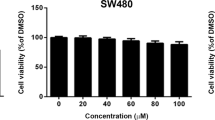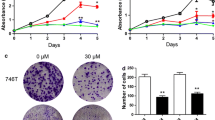Abstract
Metastasis is the main cause of death in colorectal cancer (CRC) patients. However, current treatment options for CRC metastasis are very limited. Lupeol, a triterpene that is widely found in vegetables and fruits, has been reported to possess the cancer-preventive and anti-inflammatory functions. However, the roles of Lupeol in the migration and invasion of colorectal cancer remain unclear. Here, we evaluated the effect of Lupeol treatment on colorectal cancer cell lines, HCT116 and SW620, and delineated its underlying mechanisms. Our results showed that Lupeol induced a dose-dependent inhibition of HCT116 and SW620 cells viability, measured by CCK8 assay. Wound healing and Transwell migration and invasion assays revealed that Lupeol significantly suppressed the migration and invasion of CRC cells. Using laser confocal microscope, we observed that the pseudopods and protrusions of HCT116 and SW620 cells decreased and disrupted after treatment with Lupeol. In addition, the quantitative real-time PCR and Western blotting results showed that Lupeol downregulated the expression of RhoA and RhoC, and their downstream effectors ROCK1, Cofilin, p-MLC, and the associated regulatory protein Cyclin A2. Interestingly, the migration and invasion capacity of CRC cells was reduced after RhoA knockdown. And there were no additional changes in CRC cells with RhoA knockdown to treat with Lupeol. These findings demonstrate that Lupeol can suppress the migration and invasion of colorectal cancer cells by remodeling the actin cytoskeleton via RhoA-ROCK1 pathway inhibition, which may provide an effective anti-metastatic agent for CRC patients.







Similar content being viewed by others
Change history
29 May 2020
Editor’s Note: The Editor in Chief is currently investigating this article as concerns have been raised regarding the integrity of some of data presented here. Further editorial action will be taken as appropriate once the investigation into the concerns is complete and all parties have been given an opportunity to respond in full.
16 July 2021
A Correction to this paper has been published: https://doi.org/10.1007/s00210-021-02122-1
References
Ando K, Fukuhara S, Moriya T, Obara Y, Nakahata N, Mochizuki N (2013) Rap1 potentiates endothelial cell junctions by spatially controlling myosin II activity and actin organization. J Cell Biol 202:901–916. https://doi.org/10.1083/jcb.201301115
Arber S, Barbayannis FA, Hanser H, Schneider C, Stanyon CA, Bernard O, Caroni P (1998) Regulation of actin dynamics through phosphorylation of cofilin by LIM-kinase. Nature 393:805–809. https://doi.org/10.1038/31729
Arsic N et al (2012) A novel function for Cyclin A2: control of cell invasion via RhoA signaling. J Cell Biol 196:147–162. https://doi.org/10.1083/jcb.201102085
Bendris N, Arsic N, Lemmers B, Blanchard JM (2012a) Cyclin A2, Rho GTPases and EMT. Small GTPases 3:225–228. https://doi.org/10.4161/sgtp.20791
Bendris N et al (2012b) Cyclin A2: a genuine cell cycle regulator? Biomol Concepts 3:535–543. https://doi.org/10.1515/bmc-2012-0027
Biro M, Munoz MA, Weninger W (2014) Targeting Rho-GTPases in immune cell migration and inflammation. Br J Pharmacol 171:5491–5506. https://doi.org/10.1111/bph.12658
Bradford PG, Awad AB (2007) Phytosterols as anticancer compounds. Mol Nutr Food Res 51:161–170. https://doi.org/10.1002/mnfr.200600164
Choi EK et al. (2017) Regulation of RhoA GTPase and novel target proteins for ROCK Small GTPases:1-8 doi:https://doi.org/10.1080/21541248.2017.1364831
Der CJ (2014) Rho family proteins. In: Encyclopedia of cancer. pp 1–7. doi:https://doi.org/10.1007/978-3-642-27841-9_5100-3
Fife CM, McCarroll JA, Kavallaris M (2014) Movers and shakers: cell cytoskeleton in cancer metastasis. Br J Pharmacol 171:5507–5523. https://doi.org/10.1111/bph.12704
Freddie B, Ferlay J, Soerjomataram I, Siegel RL, Torre LA, Jemal A (2018) Global cancer statistics 2018: GLOBOCAN estimates of incidence and mortality worldwide for 36 cancers in 185 countries. CA Cancer J Clin 68:394–424. https://doi.org/10.3322/caac.21492
Haga RB, Ridley AJ (2016) Rho GTPases: Regulation and roles in cancer cell biology. Small GTPases 7:207–221. https://doi.org/10.1080/21541248.2016.1232583
Hata K, Hori K, Murata J, Takahashi S (2005) Remodeling of actin cytoskeleton in Lupeol-induced B16 2F2 cell differentiation. J Biochem 138:467–472. https://doi.org/10.1093/jb/mvi151
Hsu MJ et al. (2019) Lupeol suppresses migration and invasion via p38/MAPK and PI3K/Akt signaling pathways in human osteosarcoma U-2 OS cells Biosci Biotechnol Biochem:1-11 doi:https://doi.org/10.1080/09168451.2019.1606693
Jeong D et al (2016) RhoA is associated with invasion and poor prognosis in colorectal cancer. Int J Oncol 48:714–722. https://doi.org/10.3892/ijo.2015.3281
Julian L, Olson MF (2014) Rho-associated coiled-coil containing kinases (ROCK): structure, regulation, and functions. Small GTPases 5:e29846. https://doi.org/10.4161/sgtp.29846
Kimura K, Tsuji T, Takada Y, Miki T, Narumiya S (2000) Accumulation of GTP-bound RhoA during cytokinesis and a critical role of ECT2 in this accumulation. J Biol Chem 275:17233–17236. https://doi.org/10.1074/jbc.C000212200
Laszczyk M, Jäger S, Simon-Haarhaus B, Scheffler A, Schempp CM (2006) Physical, chemical and pharmacological characterization of a new oleogel-forming triterpene extract from the outer bark of birch (Betulae Cortex). Planta Med 72:1389–1395. https://doi.org/10.1055/s-2006-951723
Lawson CD, Ridley AJ (2018) Rho GTPase signaling complexes in cell migration and invasion. J Cell Biol 217:447–457. https://doi.org/10.1083/jcb.201612069
Lee TK et al (2007) Lupeol suppresses cisplatin-induced nuclear factor-KB activation in head and neck squamous cell carcinoma and inhibits local invasion and nodal metastasis in an orthotopic nude mouse model. Cancer Res 67:8800–8809. https://doi.org/10.1158/0008-5472.CAN-07-0801
Lee TK, Castilho A, Cheung VC, Tang KH, Ma S, Ng IO (2011) Lupeol targets liver tumor-initiating cells through phosphatase and tensin homolog modulation. Hepatology 53:160–170. https://doi.org/10.1002/hep.24000
Liby KT, Yore MM, Sporn MB (2007) Triterpenoids and rexinoids as multifunctional agents for the prevention and treatment of cancer. Nat Rev Cancer 7:357–369. https://doi.org/10.1038/nrc2129
Loukil A, Cheung CT, Bendris N, Lemmers B, Peter M, Blanchard JM (2015) Cyclin A2: at the crossroads of cell cycle and cell invasion. World J Biol Chem 6:346–350. https://doi.org/10.4331/wjbc.v6.i4.346
Maekawa M et al (1999) Signaling from rho to the actin cytoskeleton through protein kinases ROCK and LIM-kinase. Science 285:895–898. https://doi.org/10.1126/science.285.5429.895
Mueller BK, Mack H, Teusch N (2005) Rho kinase, a promising drug target for neurological disorders. Nat Rev Drug Discov 4:387–398. https://doi.org/10.1038/nrd1719
Nagaraj M, Sunitha S, Varalakshmi P (2000) Effect of Lupeol, a pentacyclic triterpene, on the lipid peroxidation and antioxidant status in rat kidney after chronic cadmium exposure. J Appl Toxicol 20:413–417. https://doi.org/10.1002/1099-1263(200009/10)20:5<413::AID-JAT706>3.0.CO;2-Y
Peddareddigari VG, Wang DZ, Dubois RN (2010) The tumor microenvironment in colorectal carcinogenesis. Cancer Microenviron 3:149–166. https://doi.org/10.1007/s12307-010-0038-3
Prasad S, Kalra N, Shukla Y (2007) Hepatoprotective effects of Lupeol and mango pulp extract of carcinogen induced alteration in Swiss albino mice. Mol Nutr Food Res 51:352–359. https://doi.org/10.1002/mnfr.200600113
Ridley AJ (2013) RhoA, RhoB and RhoC have different roles in cancer cell migration. J Microsc 251:242–249. https://doi.org/10.1111/jmi.12025
Ruiz-Rodriguez MA, Vedani A, Flores-Mireles AL, Chairez-Ramirez MH, Gallegos-Infante JA, Gonzalez-Laredo RF (2017) In silico prediction of the toxic potential of Lupeol. Chem Res Toxicol 30:1562–1571. https://doi.org/10.1021/acs.chemrestox.7b00070
Saleem M, Afaq F, Adhami VM, Mukhtar H (2004) Lupeol modulates NF-kappaB and PI3K/Akt pathways and inhibits skin cancer in CD-1 mice. Oncogene 23:5203–5214. https://doi.org/10.1038/sj.onc.1207641
Saleem M, Kaur S, Kweon MH, Adhami VM, Afaq F, Mukhtar H (2005) Lupeol, a fruit and vegetable based triterpene, induces apoptotic death of human pancreatic adenocarcinoma cells via inhibition of Ras signaling pathway. Carcinogenesis 26:1956–1964. https://doi.org/10.1093/carcin/bgi157
Setzer WN, Setzer MC (2003) Plant-derived triterpenoids as potential antineoplastic agents. Mini-Rev Med Chem 3:540–556. https://doi.org/10.2174/1389557033487854
Shelton PM et al (2018) The secretion of miR-200s by a PKCζ/ADAR2 signaling axis promotes liver metastasis in colorectal. Cancer Cell Rep 23:1178–1191. https://doi.org/10.1016/j.celrep.2018.03.118
Siegel RL, Miller KD, Jemal A (2019) Cancer statistics, 2019 vol 69, 2019/01/09 edn. doi:https://doi.org/10.3322/caac.21551
Tarapore RS, Siddiqui IA, Saleem M, Adhami VM, Spiegelman VS, Mukhtar H (2010) Specific targeting of Wnt/β-catenin signaling in human melanoma cells by a dietary triterpene Lupeol. Carcinogenesis 31:1844–1853. https://doi.org/10.1093/carcin/bgq169
Tauriello DVF et al (2018) TGFβ drives immune evasion in genetically reconstituted colon cancer metastasis. Nature 554:538–543. https://doi.org/10.1038/nature25492
Van CE, Cervantes A, Nordlinger B, Arnold D (2014) Metastatic colorectal cancer: ESMO clinical practice guidelines for diagnosis, treatment and follow-up Ann Oncol 25:iii1-iii9 doi:https://doi.org/10.1093/annonc/mdu260
Vicente-Manzanares M, Ma X, Adelstein RS, Horwitz AR (2009) Non-muscle myosin II takes centre stage in cell adhesion and migration. Nat Rev Mol Cell Biol 10:778–790. https://doi.org/10.1038/nrm2786
Wang YH et al (2018) Lupeol inhibits growth and migration in two human colorectal cancer cell lines by suppression of Wnt-β-catenin pathway. Onco Targets Ther 11:7987–7999. https://doi.org/10.2147/OTT.S183925
Wioland H, Jegou A, Romet-Lemonne G (2019) Torsional stress generated by ADF/cofilin on cross-linked actin filaments boosts their severing. Proc Natl Acad Sci 116:2595–2602. https://doi.org/10.1073/pnas.1812053116
Yu XF et al (2019) CXCL12/CXCR4 promotes inflammation-driven colorectal cancer progression through activation of RhoA signaling by sponging miR-133a-3p. J Exp Clin Cancer Res 38:1–18. https://doi.org/10.1186/s13046-018-1014-x
Author information
Authors and Affiliations
Corresponding author
Ethics declarations
Conflict of interest
The authors declare that they have no conflict of interest.
Additional information
Publisher’s note
Springer Nature remains neutral with regard to jurisdictional claims in published maps and institutional affiliations.
About this article
Cite this article
Jiang, Y., Hong, D., Lou, Z. et al. RETRACTED ARTICLE: Lupeol inhibits migration and invasion of colorectal cancer cells by suppressing RhoA-ROCK1 signaling pathway. Naunyn-Schmiedeberg's Arch Pharmacol 393, 2185–2196 (2020). https://doi.org/10.1007/s00210-020-01815-3
Received:
Accepted:
Published:
Issue Date:
DOI: https://doi.org/10.1007/s00210-020-01815-3




